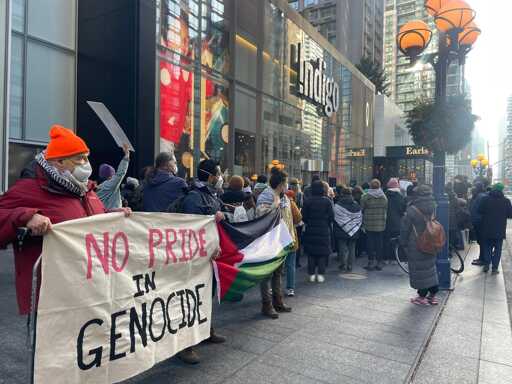In October, Indigo won an order blocking a website calling for a boycott of the bookseller. The case, largely ignored by the media, revealed a new and unlikely front in the struggle in Canada between the movement for Palestinian liberation and Israel’s powerful supporters, one which could have ramifications for other solidarity efforts.
In August, anonymous activists created the website IndigoKillsKids.ca, which has been endorsed by the Canadian BDS Coalition and other pro-Palestine organizations. The site, borrowing Indigo’s visual style, told visitors to boycott the company, promoted the September 25 day of action against it and offered links to various BDS resources. It was the latest phase in a years-long campaign to boycott the bookseller over the HESEG Foundation — founded and run by Indigo CEO Heather Reisman and her husband, Indigo’s owner Gerald Schwartz — which offers scholarships to Israeli army veterans without family in Israel.
Soon after the site went live, Indigo’s lawyer demanded it be taken down, and two weeks later filed a suit requesting an order for all major internet providers in Canada to block the site. The court granted the request, first under an interim decision issued September 19, and then with a two-year injunction on October 23, effectively shutting down the offending website along with several social media accounts for the foreseeable future. That month, it was reported that Israel’s military had killed at least 16,900 children in its assault on Gaza.
The article is a bit much.
So the group used Indigo trademarks and logos in their protest material. Indigo then went to court to protect it, as they must do. It probably should have been ruled as fair use, but the accused didn’t go to court to defend their use of the material.
That’s how things go. If they had defended their fair use, Indigo would probably have lost. But they didn’t.
Sure. But saying “that’s how things go” ignores the context of the overall atmosphere of fear and intimidation against anti-genocide activists.
In any case, the Streisand Effect is in effect. I would never have heard of this campaign if it hadn’t been for Indigo litigating against it. So there.
Sure. But saying “that’s how things go” ignores the context of the overall atmosphere of fear and intimidation against anti-genocide activists.
I don’t actually agree.
Indigo is required, legally, to defend their trademarks or risk losing them. They have to go to court on cases like this. If they went to court and the judge said “fair use” then they wouldn’t be terribly harmed; but if they didn’t go to court, then there is a chance someone else could open up a bookstore, copy their material, and point to their lack of protection as justification.
And if you’re taken to court and don’t show up, it is guaranteed that you’re going to lose.
I hate to say it, but fighting corporations (or governments!) requires commitment - which means money and lawyers and risk. Setting up a protest website is easy - but protecting it can be hard and uncomfortable. Screaming “this company is bad” is easy, but fighting them can destroy your life. If you want to change the world, you have to fucking COMMIT!
Please don’t mistake my comments though - I fully support the fight against Indigo funding Israel’s genocide, and have lost friends over the issue. But if you accuse me of ignoring the context of anti-genocide protests, then I could say you’re ignoring the context of generic, boring, due legal process in the matter.
I see your point.
‘They had to!’ is always a shit excuse. None of these corporations fight to stop that.
Honest question: if I’m avoiding Indigo and Amazon, what’s a good (preferably Canadian) online bookseller?
Add another one to the “do not buy”, bookoutlet/book depot, they closed their physical location in Niagara but still exist online. Their CEO is tied to some dodgy right wing “Christian” think tank called the Ezra Institute
Well shit, I really liked Book Depot, or at least their physical space in St. Catharines.
I’m less sad it’s gone now.
A pseudo-answer, because it’s all I know, that probably won’t be as helpful if you’re rural: I’ve gone to/called/emailed a local independent bookstore, given them the book details (the like the ISBN), they order it, and then they call me when it’s ready for pickup. Prices have been fair.
That’s a good idea I hadn’t considered. Thanks!
Maybe rethink buying new books and look for used at local book stores? I know not always ideal, and some don’t have inventory searchable online, but when it works, it’s a great way to support local
I can give that a try, although I’ve not had luck finding used copies of what I want in the past. Thanks.
So, what about new releases that we want to read? Should we just say no?
You may not get them the week they’re released but I see lots of “new” (within the past few months) releases at used book stores. Some of them do sell new as well. Depends on your shop I guess. Anyway, just a suggestion…sometimes I try my best and still end up having to use Amazon :/
Use a library
Time to add Indigo to the boycott list.







